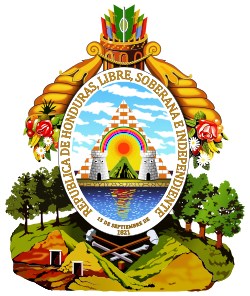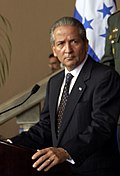| |||||||||||||||||
Presidential election | |||||||||||||||||
| Turnout | 66.27% ( | ||||||||||||||||
|---|---|---|---|---|---|---|---|---|---|---|---|---|---|---|---|---|---|
| |||||||||||||||||
Maduro: 40–50% 50–60% 60–70% Ponce: 40–50% 50–60% 60–70% 70–80% 80–90% | |||||||||||||||||
| |||||||||||||||||
 |
|---|
General elections were held in Honduras to elect a president and parliament on 25 November 2001. [1] Ricardo Maduro of the National Party was elected president with over 50% of the vote, while the National Party emerged as the largest party in the National Congress, winning 61 of the 128 seats.
Contents
Closed list PR used to elect Congress.



